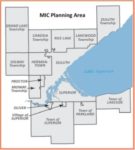The Duluth-Superior Metropolitan Interstate Council, commonly referred to as the MIC, is the designated Metropolitan Planning Organization for the Twin Ports.
MPOs conduct transportation planning, with the overall purpose of improving the movement of people and goods to their destinations—helping to get them where they need to go, safely and efficiently.
MPOs also set priorities for how federal funds are spent on current and future transportation projects.
A key goal is to focus the area’s limited transportation funding on projects that yield the greatest benefit for all users (people who drive, bicycle, walk or roll and take the bus, as well as freight) and integrate with the existing transportation system.
What We Do
Transportation planning is an ongoing and collaborative process that incorporates the input of many stakeholders, including from members of the public and private businesses. We conduct plans and studies, model the transportation system to forecast travel patterns, and program transportation projects for federal funding in the MIC Planning Area.
Therefore the MIC is required by federal statute to:
- Produce a long-range Metropolitan Transportation Plan (MTP) that articulates a community-supported vision for the multimodal transportation system, assesses how well that system is functioning, includes policies and projects to implement needed improvements, and identifies how they can be funded, for at least a 20-year timeframe.
- Develop a Transportation Improvement Program (TIP) for projects that receive federal funding in Duluth, Minnesota, and Superior, Wisconsin.
- Develop, adopt and use a Public Involvement Plan that identifies the overall strategies and specific steps the MIC will take to engage the project stakeholders at each phase of the planning process.
- Adopt a Work Program and Budget that identifies the MIC’s transportation planning activities and budget for a two-year period.
Where We Work
 The MIC’s planning jurisdiction—the Duluth-Superior Metropolitan Planning Area—encompasses 641 square miles within St. Louis and Douglas counties in Minnesota and Wisconsin, respectively. It extends from the Duluth-Superior Urbanized Area out to the first ring of non-urbanized townships.
The MIC’s planning jurisdiction—the Duluth-Superior Metropolitan Planning Area—encompasses 641 square miles within St. Louis and Douglas counties in Minnesota and Wisconsin, respectively. It extends from the Duluth-Superior Urbanized Area out to the first ring of non-urbanized townships.
In Minnesota this includes the cities of Duluth, Hermantown, Proctor and Rice Lake, and the townships of Canosia, Duluth, Grand Lake, Lakewood, Midway and Solway. In Wisconsin this includes the city of Superior, the towns of Lakeside, Parkland and Superior, and the villages of Oliver and Superior.
MIC Policy Board
Activities of the MIC are overseen by the Policy Board, which is comprised of 18 elected officials and citizens (nine from Minnesota and nine from Wisconsin) who represent all local units of government within the planning area.
MIC Staff
The professional planning staff at the Metropolitan Interstate Council is comprised of planners, GIS, communications and administrative personnel who conduct planning processes and develop technical tools to inform local policy decisions and encourage infrastructure projects that will provide a multimodal transportation system that serves all users.
They regularly consult with area jurisdictions and advise the Policy Board on transportation issues throughout the Duluth-Superior area.
Advisory Committees
Three advisory committees, the Transportation Advisory Committee (TAC), the Harbor Technical Advisory Committee (HTAC) and the newest, the Bicycle-Pedestrian Advisory Committee (BPAC), meet regularly to provide specialized technical and stakeholder input into the planning processes.
How We’re Funded
The MIC is 80% federally funded by planning funds made available through the current version of the transportation funding bill, the 2015 FAST Act, and 20% by state and local matching funds.
Our History
The Federal-Aid Highway Act of 1962 created the federal requirement for urban transportation planning largely in response to the construction of the Interstate Highway System and the planning of routes through and around urban areas. The Act required, as a condition for receiving federal transportation funds, that projects in urbanized areas of 50,000 or more in population be based on a continuing, comprehensive, urban transportation planning process undertaken cooperatively by the states and local governments. Hence, Metropolitan Planning Organizations (MPOs) quickly came into being because of the growing momentum of the highway program and the federal financing of the planning process.
The MIC was created as the MPO for the Duluth-Superior metropolitan area in 1975 under a joint agreement between the Arrowhead Regional Development Commission (ARDC) in Duluth, Minnesota, and the Northwest Regional Planning Commission (NWRPC) in Spooner, Wisconsin. The MIC is one of 420 MPOs nationwide.
Our Impact
Transportation plays a vital role in today’s economy, providing access to jobs, education, shopping, and recreation. It is an integral part of our mobile society, influencing urban development, economic vitality and quality of life.
